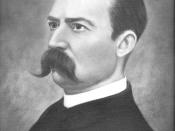Why did Hulga react so strongly to Mrs. Freeman's use of her name? To her, "it was as if Mrs. Freeman's beady steel-pointed eyes had penetrated far enough behind her face to reach some secret fact" (CS 275). Mrs. Freeman, we know, is intrigued by all accounts of disease and deformity, and this secret fact which she has discovered is deeper than a mere wooden leg: "Mrs. Freeman is fascinated by the leg, but it is a 'secret infection,' spiritual and psychological in nature, of which the leg provides intimations" (Browning 46). O'Connor herself scorned talk of symbolism, [4] but the significance of Hulga's leg is clear. It is her deformity that has shaped Hulga's identity; she "has achieved blindness by an act of will and means to keep it" (CS 273).
Her blindness, of course, is her nihilism, which, quite significantly, is sanctioned by her Ph.
D. ("I have a number of degrees" (CS 288).) The removal of this false god is Manley Pointer's symbolic defloration, the theft of her leg accompanied by his remark that she "ain't so smart. I been believing in nothing ever since I was born" (CS 291). In its place, Pointer leaves her with the knowledge that, despite her carefully constructed defense against the truth, there is, in O'Connor's words, "a wooden part of her soul that corresponds to her wooden leg" ("Writing Short Stories" MM 99).
Sheppard lacks knowledge of the Divine, or even, it seems, simple fatherly love; he is "afflicted by the doctrine of the perfectibility of human nature by its own efforts..." ("The Teaching of Literature" MM 133). Oddly, considering his belief in such perfectibility, he dismisses his son Norton as hopelessly self-centered. Instead, Sheppard invests his efforts in Johnson, who (as grandson of a would-be Noah...


